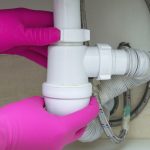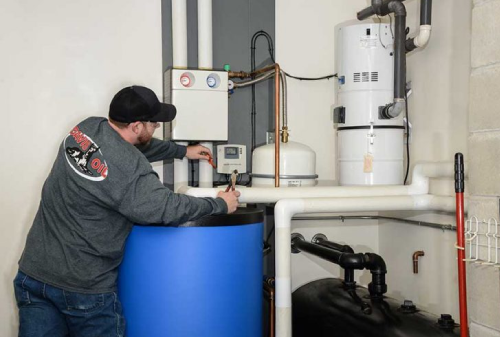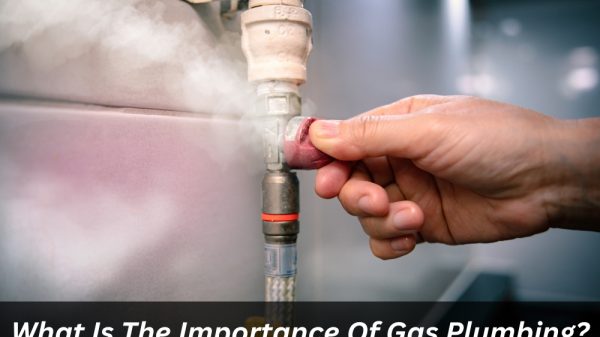Blocked drains are an unavoidable certainty of life. Most block are minor, and can easily be remedied with a plunger or over-the-counter drain cleaning solution. There are even some common household products that may be able to loosen the blockage. But for more severe and stubborn blocks, you may have to get ‘hands on’ or call a professional.
Unblocking Your Drain With a Plunger
Typically, slight block occur in the kitchen and bathroom towards the mouth of the drain, and are comprised of an accumulation of debris like food particles or a buildup of hair. If handled properly, these secondary blocks are unlikely to become more serious. But if you leave these on-the-surface blocks unattended it could result in having to call a professional plumber, or even worse, having to endure a partial repiping. Before going the chemical route, or ignoring it all together, let’s try to use some old-fashioned elbow grease first. No matter if it’s your kitchen sink, shower, toilet or bathroom sink, using a simple and sanitary toilet plunger may do the trick.
Chemical Drain Cleaners & Household Products
Chemical drain cleaners can be found at most drugstores or at your local grocer. This is a great option for those hard-to-reach blocks that otherwise won’t budge with the help of a plunger. Depending on the type of plumbing system you have, you may want to consider flushing your drains and pipes with a chemical solution once or twice a year to prevent the buildup of gunk and debris.
Keep in mind that chemical drain cleaners are dangerous and should be used sparingly. These toxic compounds are comprised of oxidising chemicals which is extremely caustic and should not be inhaled or used in a closed-door environment. Make sure you open a window or have proper ventilation when using chemical drain cleaners.
Another important factor to hammer home is that drain cleaners like Drano should NOT be used to unblocks your toilet. The chemical composition of these products creates intense heat that can crack porcelain and even soften PVC piping, which could wind up costing you serious bucks to repair. Plungers remain the best way to quickly remedy minor blocks in your toilet.
If you are staunchly against using harsh chemicals of any sort, there are some common household products that can help break up debris in your drains and help clear-up blocks.
- Baking Soda and Vinegar
- Baking Soda and Lemon Juice
- Baking Soda and Salt
- Salt/Sodium Borate/Vinegar
- Baking Soda/Salt/Cream of Tartar
How do you know if the block is more serious?
When plunging and chemicals aren’t doing the trick, you may have a more serious problem afflicting your plumbing system. While most minor blocks can be broken up and properly flushed out without the help of a professional, if debris accumulates and starts to build up, you could be looking at a blocked sewer line. The sewer line is the main pipe and thoroughfare for all the plumbing that leaves your property. If this gets blocked, much larger problems can arise. So what are some warning signs that your sewer line is blocked?
- Gurgling sounds coming from drains and pipes
- Multiple drains are backed up and not draining
- Wastewater is overflowing into your bathroom and sinks
- You notice debris, like bark or solid waste, in the pooling water
Trying to unblock a blocked sewer line yourself could prove to be above most people’s paygrade. Meaning, it isn’t something that you should take on unless you are experienced with complex plumbing solutions.
In the event you are relatively advanced and know a thing or two about sewer systems, here are some tips for locating the sewer blocks and trying to fix it yourself. This will likely require the use of a snake or auger tool, which you can find at most home improvement or hardware stores.
Sewer lines are typically easy to locate. Often noticeable by a Y-shaped access port, the sewer line will likely be in an accessible location and close to your home. Once you’ve located the sewer line, you’ll want to find the access cover. Depending on the severity of the block, you could be contending with pressure that has built up in the pipeline. Make sure to stand clear when opening the access cover, as unpleasant air and raw sewage could come spewing out.
To unblock the blockage, carefully feed the snake into the section of the pipe where you think the block is occurring and aim it towards the obstruction. You may have to use a little muscle and move the snake back and forth several times to break-up the block. If you feel resistance, followed by some give, it is likely you have successfully broken up the debris that was obstructing your sewer line.
When to Call a Professional Plumber
If you have tried plunging, used chemicals, even went as far as becoming a plumber for the day, and water is still pooling or not draining in your shower, toilet and sinks, it is probably time to call a professional plumber.
Licensed plumbers will have access to heavy-duty equipment that can easily break up blocks and properly clean your drains, pipes and sewer lines of any build-up so that you won’t run into this problem again.
After a professional has unblocked your drains and cleaned out your sewer lines, you should take it upon yourself to conduct proper maintenance on your plumbing system. That means frequently removing debris from drain covers and making sure you are not dumping particles of food down the drain in your kitchen. This gives you the best shot at not being hassled by recurring problems with your plumbing.












